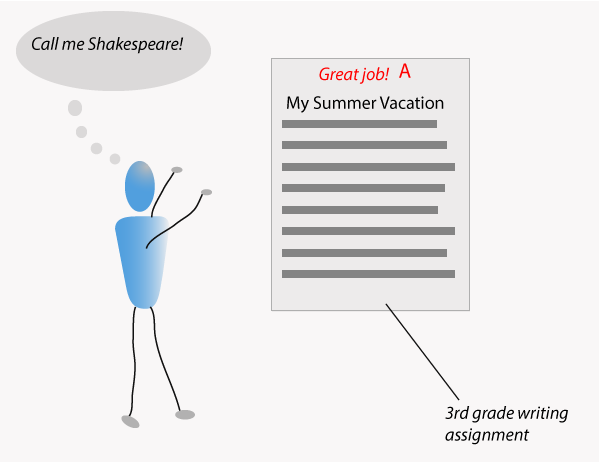Writing Is Harder Than Most Think (Wikis)

Another challenge in engaging volunteer writers is that so many people overestimate their writing abilities. Certainly writing skills can be measured on a spectrum, with varying levels of competence. Earning an A from a high school English class may inspire someone with confidence that they can write, but their writing skills may be more tailored to a specific situation that does not match the assignment at hand.
Technical writing usually follows a meticulously detailed, step-by-step procedural approach. You likely have a style guide and general methodology that you follow. Volunteers who try to jump into technical writing tasks usually don't have this background.
Even with blog articles, I haven't had many volunteers who can simply write an article that requires little editing. Many people have expectations about blogging that are much lower than our organization's publishing standards. Because it's a blog, suddenly their writing voice becomes unnaturally informal, the organization less structured, and the ideas less developed.
When a volunteer submits a draft that needs a lot of work, it poses a challenge for the project leaders. Do you scrap an article that requires too much editing, even at the risk of offending the volunteer? Do you try to salvage the article by heavily rewriting it? Do you thank the volunteer for his or her efforts and then sit indefinitely on the article, shelving it unpublished?
I have tried all of the above. While at times I've been impressed by content that volunteers write, all too often the content requires too much editing and rework to make the effort worth it. Many times volunteers who participate on writing projects are looking for opportunities to improve their writing. Many professional writers simply aren't interested in volunteering writing in their own time.
In addition to writing articles, I have also tried giving articles to volunteers to edit. One person suggested that I rotate articles through a series of volunteer edits, hopefully ratcheting up the quality with each volunteer edit.
I have tried this, and many of the edits usually are light proofreads, corrected misspellings here and there. They fix grammar in places, but never really address higher order concerns of organization, ideas, accuracy, and other more significant content matters.
Do You Really Need a Wiki for Volunteers?
At one time I thought that if collaboration with the community were a high priority, then I needed to use a wiki as a collaborative platform. How could I engage in collaborative efforts without a wiki?

Although this seems logical, it turns out that a wiki is not necessary for collaboration. Many volunteers who write articles are uncomfortable publishing them directly on the wiki. They prefer to write in Microsoft Word and upload the articles to Dropbox or JIRA.
If you want volunteers to publish content directly on the wiki, you will need to teach them wiki syntax. Given all the work you usually do to provide feedback on the content and shepherd and article through successive edits, holding a volunteer's hand as he or she learns wiki syntax (and then correcting their wiki syntax errors) usually turns out to be more overhead than it's worth. It's easier to simply publish the article for the volunteer instead.
When I started to realize that wikis weren't a necessary platform for interacting with volunteers, I started to rethink the wiki as a platform. You can have a lot of success with community and collaboration without using a wiki at all. In fact, because the content is not being published live, for the whole world to see and immediately interact with, volunteers actually feel more comfortable contributing.
Now, I'm not saying this is the case for all community efforts. Certainly large-scale efforts like Wikipedia run on a model that is entirely wiki-based, from the recruiting to the coordinating of assignments to the publishing. But in my experience, that kind of natural interaction will not arise without a strong guiding self-interest in the volunteers.
With WordPress, many volunteers have this self-guiding interest because they're building a plugin to fit their needs. With Wikipedia, a subject matter expert may have a reason for shaping information about a topic he or she is expert about. With Youtube, contributors aren't uploading videos out of any desire to create a library of video content. Usually they just need a platform to publish their videos.
When volunteers don't have a strong personal motive for engaging in the work, but are rather volunteering for more altruistic motives, you need to provide more direct guidance and encouragement in the volunteer process. You need to make it as easy and comfortable for them as possible to contribute.
About Tom Johnson

I'm an API technical writer based in the Seattle area. On this blog, I write about topics related to technical writing and communication — such as software documentation, API documentation, AI, information architecture, content strategy, writing processes, plain language, tech comm careers, and more. Check out my API documentation course if you're looking for more info about documenting APIs. Or see my posts on AI and AI course section for more on the latest in AI and tech comm.
If you're a technical writer and want to keep on top of the latest trends in the tech comm, be sure to subscribe to email updates below. You can also learn more about me or contact me. Finally, note that the opinions I express on my blog are my own points of view, not that of my employer.
